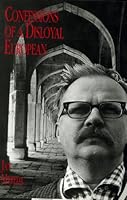- Welcome to FictionDB, Guest
- | My Account
- | Help

Confessions of a Disloyal European — Jan Myrdal
buy the book from amazon
Paperback editions:
Hardcover editions:
eBook editions:
Audio editions:
Large Print editions:
Description
He writes without flinching about his difficult childhood years in the U.S. and Sweden, a young man facing love and betrayal, the hardships of a writer enduring poverty and censorship, and most of all the struggle to understand his times and place himself on an honest moral and political footing. He confronts these experiences and uses them, as he says, "to make the European intellectual as a type clearly visible."
Jan Myrdal observes the Western intellectual from a unique vantage point as the son of Sweden's most celebrated intellectuals, Nobel Laureates Gunnar and Alva Myrdal, engineers of the Swedish welfare state and leaders of progressive democratic thought. These family ties give a chilling resonance to Jan's questioning of the Western tradition;'s claims to progress and reason.
His personal journey ends dramatically as he confronts Western racism in Asia and the preventable suicide of a friend in Stockholm. The political and the personal become inseparable, and he ends with an indictment in which she spares no one, not even himself and his own attempts to break from lies and corruption.
The new edition has a new preface by the author and a new foreword by Harrison Salisbury.
Myrdal has written other autobiographical novels. "Childhood," dealing with his first 10 years, was a succes de scandale in Sweden and became a bestseller there after attempts to suppress it failed. The second book in Myrdal's childhood series, "Another World," won the Literature Foundation's Great Prize for the Novel. The Third, "Twelve Going on Thirteen," won the Esselte Prize for Literature and was distributed free to 100,000 of Sweden's middle school children-a strange fate for Sweden's most outspoken oppositional figure.
Myrdal's autobiography about his teenage and adult years, "Confessions of a Disloyal European," was chosen by The New York Times as "one of ten books of particular significance and excellence in 1968." The celebrated French critic Bernard Pivot selected it as one of the Scandinavian classics in his TV series/book/exhibition, La bibliotheque ideale.

 Amazon UK
Amazon UK